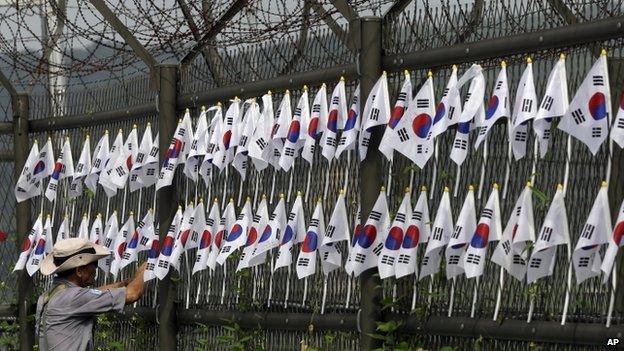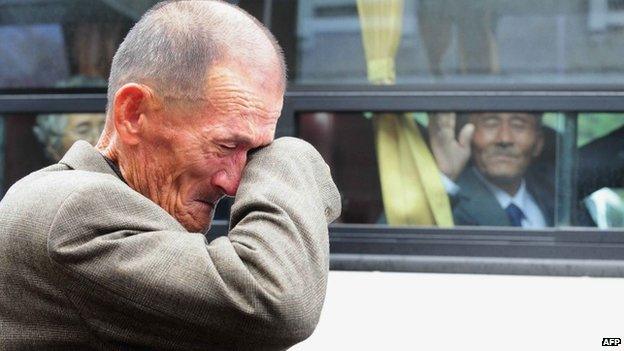Korean man prepares to meet his brother after 64 years
- Published
Lee Du-young: "All that was missing in my life was my brother"
About 170 estranged relatives from North and South Korea are preparing to meet each other on Thursday for the first time in more than six decades.
The chosen individuals - about half from each side - will bring their families to a North Korean tourist site, where they'll spend a few days together. It is the first time in three years that cross-border family reunions have been held.
Mr Lee was 12 years old the last time he could buy presents for his brother.
Since they were separated, 64 birthdays have come and gone. Now the gifts he is taking to meet him are those for an old man battling North Korea's harsh winter cold.
Softly-spoken
"It's colder up north, so I've bought him a winter coat, and some thermal underwear," Mr Lee told me, as he laid out the presents on his living room floor.

The pain of separation is keenly felt by thousands in South and North Korea
"And I heard that South Korean chocolate biscuits are sought-after treats there, so I'm going to buy him some of those and some medicines as well."
Mr Lee's brother was just a teenager when he was taken by the North Korean army during the Korean War.
He remembers him as being softly-spoken and very kind. But the family has been apart so long that his older brother got Mr Lee's first name wrong on the application form.
"It's not a very good sign, is it?" joked his wife, who has spent 50 years hearing stories about her missing brother-in-law.
"I never dreamt that I would be meeting him in person," she said. "It's one of the best gifts I've ever received in my life. It's overwhelming."
'No regrets'
Her husband struggles to find words to sum up his emotions.
"It's hard for people to understand what it's like when you've been separated so long," he said, "but it's a true miracle; I'm so elated. All that was missing in my life was my brother, and now that I can see him again, I'd have no regrets whatsoever if I were to die tomorrow."

Past reunions have proved emotional
Footage of previous reunions shows the powerful poignancy of meeting family again after a lifetime has gone by. But the lucky few participants at these events get just nine hours to spend with their long-lost siblings, children or uncles.
The advice given to South Korean relatives is to make a list of suitable conversation topics: "Avoid all talk of politics or economic hardship in the North," the advice sheet says, "and if your family members break into propaganda songs, don't join in."
'Dwindling hope'
UN sanctions also ban South Koreans from bringing in luxury items like expensive watches or electronic goods for their relatives. Mr Lee says he just wants to know what happened to his brother, and to thank him for being alive.
But for every one like him, there are thousands still waiting in South Korea with dwindling hope.
The Red Cross has more than 70,000 applicants on its waiting list, and half of them are over 80. Since the last reunion took place three years ago, many others have died without meeting their relatives.
Yeo In-Chan, 83, runs a group for separated families in the southern city of Busan.
"The way that they're conducting the reunions is very restrictive," he told me. "It needs to change, so that more people can meet freely.
"When people are being reunited in groups of 100, it leaves so many people painstakingly waiting for their turns - longing to be reunited, but being forcibly kept apart.
"The pain is indescribable; people are infused with a deep sorrow."
After 64 years of waiting, Mr Lee is now due to fulfil his dream and says that he can now die in peace,
But there are many others on both sides of the border who will probably have to live - and die - without it.
- Published24 January 2014
- Published21 September 2013
- Published6 February 2014